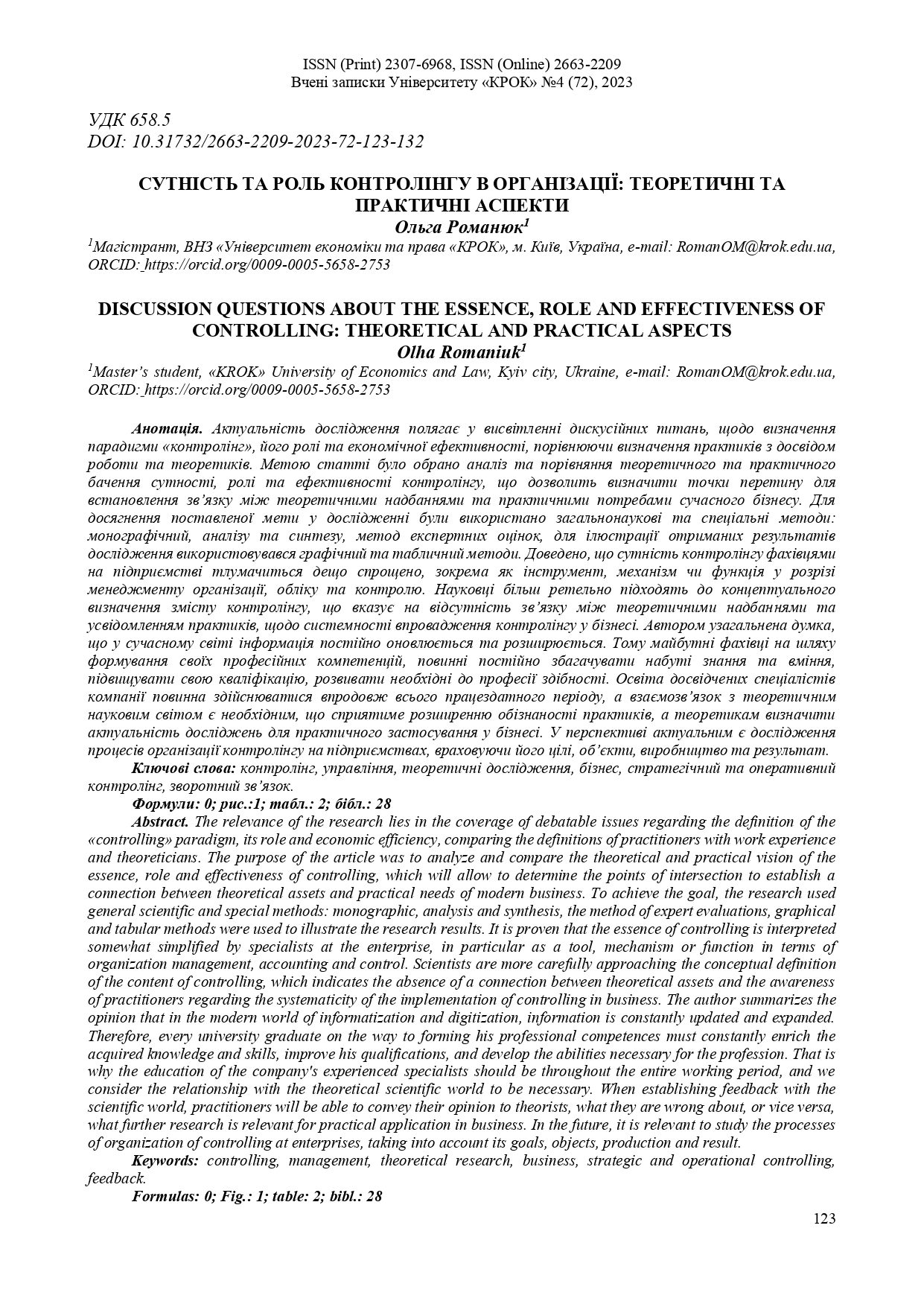DISCUSSION QUESTIONS ABOUT THE ESSENCE, ROLE AND EFFECTIVENESS OF CONTROLLING: THEORETICAL AND PRACTICAL ASPECTS
DOI:
https://doi.org/10.31732/2663-2209-2023-72-123-132Abstract
The relevance of the research lies in the coverage of debatable issues regarding the definition of the «controlling» paradigm, its role and economic efficiency, comparing the definitions of practitioners with work experience and theoreticians. The purpose of the article was to analyze and compare the theoretical and practical vision of the essence, role and effectiveness of controlling, which will allow to determine the points of intersection to establish a connection between theoretical assets and practical needs of modern business. To achieve the goal, the research used general scientific and special methods: monographic, analysis and synthesis, the method of expert evaluations, graphical and tabular methods were used to illustrate the research results. It is proven that the essence of controlling is interpreted somewhat simplified by specialists at the enterprise, in particular as a tool, mechanism or function in terms of organization management, accounting and control. Scientists are more carefully approaching the conceptual definition of the content of controlling, which indicates the absence of a connection between theoretical assets and the awareness of practitioners regarding the systematicity of the implementation of controlling in business. The author summarizes the opinion that in the modern world of informatization and digitization, information is constantly updated and expanded. Therefore, every university graduate on the way to forming his professional competences must constantly enrich the acquired knowledge and skills, improve his qualifications, and develop the abilities necessary for the profession. That is why the education of the company's experienced specialists should be throughout the entire working period, and we consider the relationship with the theoretical scientific world to be necessary. When establishing feedback with the scientific world, practitioners will be able to convey their opinion to theorists, what they are wrong about, or vice versa, what further research is relevant for practical application in business. In the future, it is relevant to study the processes of organization of controlling at enterprises, taking into account its goals, objects, production and result.
Downloads
References
Балог, Л. В. (2015) Сутність логістичного контролінгу та його роль в процесі управління підприємством. Глобальні та національні проблеми економіки. Електронне наукове фахове видання, 8, 312-315. Отримано з http://www.global-national.in.ua/archive/8-2015/64.pdf
Брітченко, І.Г., Князевич, А.О. (2015). Контролінг: навч. посібник. Рівне: Волинські обереги. Отримано з https://www.researchgate.net/publication/304254518_Kontroling
Бужимська, К.О., Царук, І.М. (2021). Формування та розвиток системи контролінгу на промислових підприємствах. Економіка, управління та адміністрування, 1(95), 3-7. doi:10.26642/ema-2021-1(95)-3-7
Васильєва, Т. А., Рябенков, О. В. (2014). Фінансовий контролінг як інструмент управління економічними процесами на підприємстві. Вісник Української академії банківської справи, 1(36), 84-90. Отримано з https://essuir.sumdu.edu.ua/handle/123456789/52881
Васильченко, М.І., Коломієць, А.І., Краєва, А. А. (2018). Контролінг логістичної діяльності підприємства в умовах невизначеності зовнішнього середовища: управлінський аспект. Електронний науково-практичний журнал 25, 193-199. Отримано з https://chmnu.edu.ua/wp-content/uploads/2019/07/Vasilchenko-M.-I..pdf
Виговська, Н. Г. (2013) Антикризовий фінансовий контролінг як інструмент запобігання банкрутства. Вісник ЖДТУ, 4(66) Отримано з https://library.ztu.edu.ua/e-copies/VISNUK/66_4/146.pdf
Жавнерчик, О.В. (2019). Контролінг: конспект лекцій. Одеса: ОДЕКУ. Отримано з http://eprints.library.odeku.edu.ua/id/eprint/5846/
Клюс, М. І. (2014). Організація інформаційних потоків і облікових даних у системі контролінгу. Проблеми і перспективи розвитку банківської системи України, 38, 344-350. Отримано з http://nbuv.gov.ua/UJRN/pprbsu_2014_38_36
Козак, Л. С., Гаврилюк, Н. М. (2015). Функції та принципи реалізації концепції логістичного контролінгу на підприємстві. Вісник Національного транспортного університету, 3, 164-173. Отримано з http://publications.ntu.edu.ua/visnyk/33_2015/164-173.pdf
Корінєв, В. Л. (2013). Контролінг у системі управління маркетингом на підприємстві. Держава та регіони. Економіка та підприємництво, 3, 113-116. Отримано з http://nbuv.gov.ua/UJRN/drep_2013_3_22
Крисак, Ж. М., Луценко, І. С. (2017). Контролінг як основа оптимізації логістичних процесів на підприємстві. Актуальні проблеми економіки та управління: збірник наукових праць молодих вчених, 11. Отримано з https://ela.kpi.ua/handle/123456789/22554
Ніколаєв, І.В., Коваль, Л.А., Василенко, Д.В. (2021). Контролінг в системі управління підприємствами АПК. Електронне наукове фахове видання, 1. 1-11. doi: 10.32702/2307-2105-2021.1.112
Остапенко, О.М. (2015). Контролінг. Кіровоград, КЛА НАУ. Отримано з https://dspace.sfa.org.ua/bitstream/123456789/245/1/Ostapenko_kontrolling.pdf
Полуяктова, О.В. (2018). Підготовка менеджерів та практиків управління. Глобальні та національні проблеми економіки. Електронне наукове фахове видання, 21. 39-43. Отримано з http://global-national.in.ua/archive/21-2018/9.pdf
Про Державну контрольно-ревізійну службу. (Закон України) № 2940-XII (1993). Отримано з https://zakon.rada.gov.ua/laws/show/2940-12#Text
Програма «Fit for Partner ship with Germany» у 2023 році. Програма Федерального міністерства економіки та захисту клімату. Отримано з https://ukraine.managerprogramm.de
Прокопець, Л. В. (2019) Контролінг як інструмент управління підприємством. Причорноморські економічні студії 39(2), 17-20. Отримано з http://bses.in.ua/journals/2019/39_2_2019/5.pdf
Рибак, О. В. (2013) Методи контролінгу в системі інструментарного аналізу організаційного середовища підприємства. Регіональна бізнес-економіка та управління, 1, 168-173. Отримано з http://nbuv.gov.ua/UJRN/Rbetu_2013_1_52
Ручкіна, М.М. (2016) Контролінг в управлінській діяльності. Вісник Черкаського університету. 13, 1-8. Отримано з https://ped-ejournal.cdu.edu.ua/article/view/1624/1687
Хмурова, В. В., Лапко, С. В. (2014). Ефективність впровадження контролінгу на підприємствах. Вісник Бердянського університету менеджменту і бізнесу, 3(27), 76-78. Отримано з http://old.bumib.edu.ua/sites/default/files/visnyk/17_4.pdf
Brech, E. F. L. (1975). The principles and practice of management. New York: Longman. Отримано з https://archive.org/details/principlespracti0000brec/mode/2up
Dědečková, N. (2020). Control, controlling an ditsobjectives in the organization. SHS Web of Conferences 83, 01009. doi:10.1051/shsconf/20208301009
Fayol, J. H. (1916) Administration Industrielle et Générale, пер. з фран. Бабина-Кореня, Б. В. (1923). Центр гуманітраних технологій. Отримано з https://gtmarket.ru/library/basis/5783/5788
Hungenberg, H., Wulf, T. (2021). Controlling. In: Grundlagen der Unternehmensführung. Springer Gabler, Wiesbaden. Отримано з https://doi.org/10.1007/978-3-658-35423-7_6
Kantnerová, L.&Vaněček, D. (2012) Logistic controlling. The Scientific Journal for Economics, Management and Trade České Budějovice, XIII(2), 77-86. doi:10.32725/acta.2010.022
Koontz, H., O'Donnell, C., (1908). Management. New York: McGraw-Hill (1980). Отримано з https://archive.org/details/management00koon/page/n9/mode/2up
Mockler, R. J. (1972). The management control process. New York, Appleton-Century-Crofts. Отримано з https://archive.org/details/isbn_390644404
Todorovic, A., Stanišić, M., Perovic, V. (2017). Contribution of controlling to business efficiency. Industrija 45(1), 25-44. doi:10.5937/industrija45-11003

Downloads
Published
How to Cite
Issue
Section
License

This work is licensed under a Creative Commons Attribution-NonCommercial 4.0 International License.

